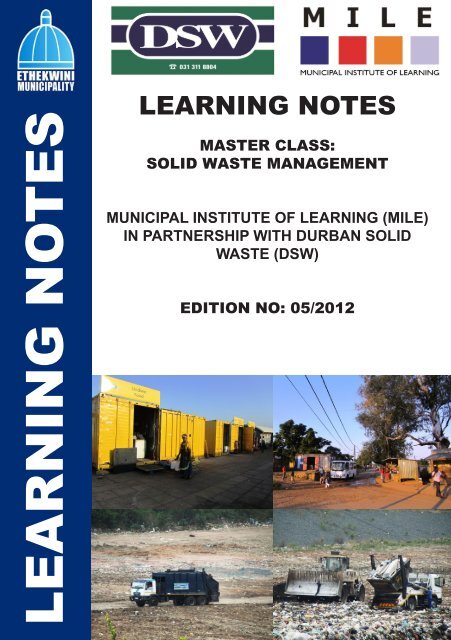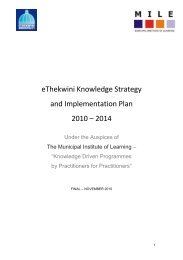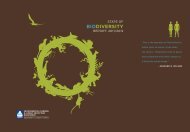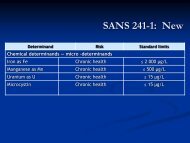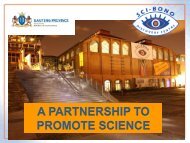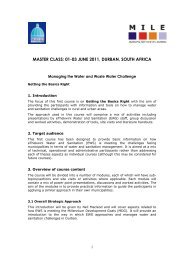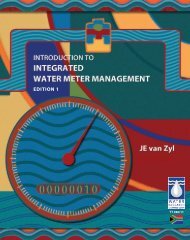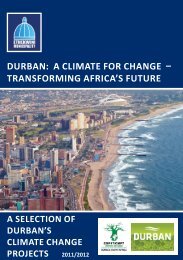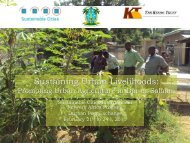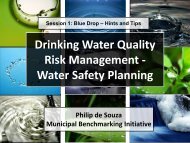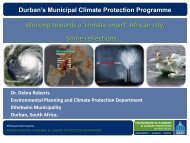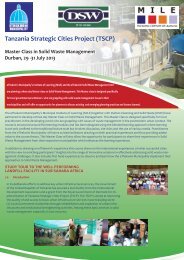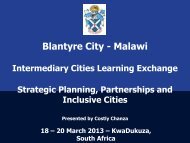Solid Waste Management Master Class- Learning Notes - MILE
Solid Waste Management Master Class- Learning Notes - MILE
Solid Waste Management Master Class- Learning Notes - MILE
Create successful ePaper yourself
Turn your PDF publications into a flip-book with our unique Google optimized e-Paper software.
Table of ContentsAbbreviationsAbout <strong>MILE</strong> and the <strong>Master</strong> <strong>Class</strong> ProgrammeAbout <strong>Learning</strong> <strong>Notes</strong>Introduction1. A Strategic Approach to <strong>Solid</strong> <strong>Waste</strong> <strong>Management</strong>2. <strong>Solid</strong> <strong>Waste</strong> Operations: Theory and Practice3. New Area <strong>Management</strong>4. Education, <strong>Waste</strong> Minimisation And Recycling5. <strong>Waste</strong> Minimisation And Recycling6. Landfill <strong>Management</strong>, The Challenges and ResponsesConclusion
Acronyms and AbbreviationsDSW<strong>MILE</strong>NGODurban <strong>Solid</strong> <strong>Waste</strong> (Cleansing and <strong>Solid</strong> <strong>Waste</strong>)Municipal Institute of <strong>Learning</strong>Non-Government Organisation
About <strong>MILE</strong> and the <strong>Master</strong> <strong>Class</strong>ProgrammeThe <strong>MILE</strong> <strong>Master</strong> <strong>Class</strong>es are run by professionals whoare experts in their field and are being recognised for theircontributions to their field. These experts are drawn fromeThekwini Municipality and other municipalities that may beinterested, and supplemented with academics from partnertertiary institutions. <strong>MILE</strong> aims to enhance the capacity of localgovernment practitioners in Africa at large. One of the keylearning mechanisms in achieving this goal is the <strong>MILE</strong> <strong>Master</strong><strong>Class</strong> – which is essentially experiential action learning. The<strong>Master</strong> <strong>Class</strong> sessions are targeted at municipal practitionersdirectly involved in the respective content areas. Whilst it isprimarily designed for officials at a technical and manageriallevel, Councillors involved in these fields may also benefit. At thisstage, all <strong>Master</strong> <strong>Class</strong>es are run in English. Should translationinto French or other languages be required, arrangements needto be made well in advance. <strong>MILE</strong> has found that the optimalduration for its courses is over a period of three consecutivedays. Longer periods out of the office may not be sustainable.The eThekwini Municipality realised the need for a peer basedlearning intervention to support the emerging and changingneeds of South African and African municipalities. eThekwiniMunicipality has conceived its peer learning intervention underthe auspices of the Municipal Institute of <strong>Learning</strong> (<strong>MILE</strong>),which they hope will position Durban as a Centre of <strong>Learning</strong> inSouth Africa and the African continent. <strong>MILE</strong> is structured alongfour learning ‘pillars’: Capacity Building, Strategic Partnershipsand Networks, Collaborating with Academia and MunicipalTechnical Support. These programme ‘pillars’ are underpinnedby an integrated knowledge management process.
The <strong>Solid</strong> <strong>Waste</strong> master class was developed by the eThekwini<strong>Solid</strong> <strong>Waste</strong> and Cleansing Unit and the focus is on “gettingthe basics right” with the aim of providing the participantswith information and tools on how to manage solid wastemanagement challenges.The master class covers a number of themes, each of which hassub-topics/sections and site visits or activities where applicable.Each theme contains a mix of power point presentations,discussions and worked activities. The aim of the themes isto provide practical information to guide the participants inapplying a similar approach in their own municipalities.
About <strong>Learning</strong> <strong>Notes</strong>The <strong>Learning</strong> <strong>Notes</strong> (LNs) are intended to serve as reminders ofkey issues, discussions and challenges that emanated from the<strong>Solid</strong> <strong>Waste</strong> <strong>Master</strong> <strong>Class</strong> hosted by eThekwini Municipality -<strong>MILE</strong> in partnership with DSW on 09, 10, and 11 May 2012.They are based on lessons learned from the experience andaccumulated knowledge of the eThekwini Municipality’s <strong>Solid</strong><strong>Waste</strong> and Cleansing Unit.As part of the <strong>Master</strong> <strong>Class</strong>, issues and challenges, lessonslearned sources of information and examples of good practice,as well as recommendations were considered. The participantswere drawn into some relevant examples from eThekwiniMunicipality projects, programmes, and other sources andrelevant information. It is hoped that they will help municipalpractitioners in dealing with important decisions during thedesign, execution and evaluation of projects and programmes.The LNs seek to assist in generating information required toprepare and enhance the quality of solid waste management aswell as service delivery in general. It is hoped that the outcomeof the master class session will go a long way in assistingmunicipalities to provide practical solutions to solid wastemanagement challenges.Although these LNs are freely available, the intended users arepeople involved in <strong>Solid</strong> <strong>Waste</strong> <strong>Management</strong> programmes inlocal government in Africa. It is assumed that LN users havehad some exposure to solid waste management related matters,but for those less familiar, sources can be provided for moredetailed information and examples of good practice. The LNthemes are grouped under the domains to which they relate.Comments and suggestions for the improvement of these LNsare welcome. This is an open ended series of LN updated andimproved on an ongoing basis. More will be added as necessary.These, together with requests for further information, shouldbe addressed to mile@durban.gov.za.
IntroductionThe <strong>Solid</strong> <strong>Waste</strong> <strong>Management</strong> master class was designed todeepen participants understanding of what can be achievedin the field of waste management. Previously, the master classhas been attended by Directors and Managers; however, it wasdesigned particularly for operational and technical officialsworking at the level of local government. The objective wasto provide a platform for municipal practitioners to learnand share experiences from their respective municipalities.The master class covered the following areas: a strategicapproach to solid waste; landfill management; education, wasteminimisation and recycling; solid waste operations; and newarea management. At the end of the master class, participantswould gained an appreciation of the importance of adopting astrategic management approach; an understanding of technicaloperations; exposure to good practice; and access to learningnetworks, contacts and support.
General OverviewOutcomes:The general overview of the master class is to outline theimplementation of a solid waste management strategy andunderstanding the relationship between politicians, thecommunity and administration.Challenges:• Political decision making – housing, water, sanitation, roadsand electricity are prioritised over solid waste management.• Lack of capacity – policy, budgeting, skills, resources,knowledge, etc.• Behavioural change – lack of education amongst thecommunity.• Lack of enforcement, monitoring and the imposing of penalties• Lack of sense of responsibility• Maintaining a good reputation.• Lack of research and scenario planning in waste management.Lessons Learned:• <strong>Waste</strong> management practitioners need to have the will andthe know how to deal with politicians and the community.• The Constitution, <strong>Solid</strong> <strong>Waste</strong> <strong>Management</strong> Act (i.e. essentialservice), <strong>Solid</strong> <strong>Waste</strong> <strong>Management</strong> strategy stipulates thatmunicipalities must maintain clean environments now and forfuture generations.
1 A Strategic Approach to <strong>Solid</strong><strong>Waste</strong> <strong>Management</strong>Outcomes:In Theme 1, we discussed strategic approaches to wastemanagement; how eThekwini Municipality responds tochallenges; and the extent to which the approach can be appliedto other municipalities.Challenges:• The focus on illegal dumping is increasing budget expenditurefor enforcement and security management.• Some areas not cleaned because there are “responsibilityissues” between municipalities and government departments(e.g. some roads and freeways running through municipalareas are a competency of provincial and national departments)– unfortunately, communities cannot differentiate between thespheres of government in respect to service delivery.Lessons Learned:• <strong>Solid</strong> waste management units should be branded forcommunication and marketing purposes; and enhance mediacoverage, clean up campaigns and training programmes.• The public needs to be educated on an on-going basis aboutwaste management.• Municipalities must establish partnerships with business,NGOs, educational institutions, government departments,informal traders and taxi associations.
• To address solid waste management holistically in amunicipality, the various departments need to team up inaddressing waste issues. All departments have a role to play insolid waste management.
2<strong>Solid</strong> <strong>Waste</strong> Operations: Theoryand PracticeOutcomes:Theme 2 related to technical details and practical experiencesaround the operation of refuse removal, street cleaning,disposal, site management, transfer stations, special events andso on.Challenges:• Illegal dumping management – it is difficult to manage illegaldumping hotspots. It is costing municipalities millions eachyear and is also resulting in unfair labour strikes, overtimepayments etc.• Staff management – disciplinary issues and organisedlabour. Municipalities are highly unionised and solid wastemanagement departments are the most radical.Lessons Learned:• Illegal dumping management needs to be part of employeeperformance plans.• Communities around illegal dumping hotspots need to beinvolved and educated in dealing with these areas.• It is of utmost importance to meet with trade unions andsenior management on a regular basis to discuss and addresscommunity and staff issues.
3New Area <strong>Management</strong>Outcome:Theme 3 revolved around deepening the participantsunderstanding of setting up structures and systems inpreviously un-serviced areas; new area development; andcommunity based operations including the employment oflocal contractors.Challenges:• The topography and access are often a problem in providinga solid waste management service in certain areas.Lessons Learned:• Owner absenteeism – Contractors owners are often not readilyavailable to make decisions.• Human Resources – shortage of Inspectors• Political interference• The provision of waste management services is a moving target.There is a continuous growth in the number of households.• Lack of community participation resulting in illegal dumping• Road infrastructure – the terrain are in a poor condition• Resources – the vehicles utilised are not within the requiredstandard and specification.• Community based areas – contract does not cover all formsof waste removal (i.e. animal carcasses, illegal, waste frominstitutions, cleaning of non-built up areas, streams and
emptying of bins, transit camps, township businesses, builder’srubble etc.)• Hostels – are a competency of provincial government• The number of refuse bags given to households is limited andperhaps non-existent in informal areas.Lessons Learned:• Municipalities, particularly metropolitan cities, shouldconsider the use of service providers in new developmentareas and informal settlements. The use of service providersenhances efficiency in waste management and empowers localcommunities.
4 Education, <strong>Waste</strong> MinimisationAnd RecyclingOutcome:Theme 4 focused on the role education can play in wastemanagement; how eThekwini Municipality has rolled out itseducational programmes; and the extent to which this approachcan be applied to other municipalities.Challenges:• Lack of sense of ownership of the environment.• Attitudes towards the areas we occupy at any given time.• Operational efficiency is often problematic for municipalities(e.g. is it more efficient to use bins as opposed to plastic bagswhen collecting waste?). The task system has “failed” in manymunicipalities due to the fact that labour demands overtime formore work if the task has been completed regardless of the factthat the workers are employed on an eight hour shift.Lessons Learned:• Municipalities need to create awareness through educationprogrammes (i.e. reducing, reusing and recycling) focusing onminimising incidences of littering, illegal dumping practicesand waste going to landfill.• Municipalities must empower and enable all sectors to takeresponsibility of their waste management practices.• There are four essential components of a clean communitysystem, namely, standards, facilities, education, andenforcement.
• A process of project management needs to be adopted indealing with waste management issues – promotion, customerbuy in, process, implementation, monitoring and reinforcement.• <strong>Waste</strong> management education programmes should beincremental in targeted areas (i.e. hot spots). Target a fewhouseholds initially before you expand to the rest of thecommunity.
5<strong>Waste</strong> Minimisation AndRecyclingOutcomes:Theme 5 revolved around recycling through buy back centres,drop off centres, material recycling facilities and recyclingstations.Challenges:• Customer related – garden waste and ,mixed waste in orangebags; recyclables in black bags; customers no buying in• Illegal collection by private collectors and scavengers.• Staff insecurity and threats• The programme is costly to the municipality and thecontractor.• Poor service leading to “bad” image.• Abuse of plastic refuse bags – used for wrongful purposesLessons Learned:• The residents need to support the programme.• Residents must ensure separation at source and prevent themixing waste – recyclables and non-recyclables.•,Residents must place recycled waste in time for collection• There are benefits of the domestic recycling programme to theenvironment, cost effectiveness, creation of jobs, partnerships
with citizens and communities, business opportunities, etc.• Municipalities must educate and assist others to participatein the project.Some lessons from an NGO: Asiye eTafuleni:• The role of the informal economy (i.e. informal recyclingcommunities) is proving to be effective for recycling worldwide.They are filling a gap that is not necessarily covered by municipalsolid waste management strategies.• Municipalities must create greater access to materials andincreased incomes.• There are benefits of organising and structure informalactivities.• Municipalities need to establish awareness of occupationalhealth and safety needs and ergonomic advantages of trolley.• There needs to be effective and on-going technical feedback.• Greater dignity and ownership –• There needs to be an improved perception of informalrecyclers.• Better understanding of integrated urban managementchallenges.Site Visits: Kloof buy back centre, Westmead Buy Back Centreand Izaka PlasticsSome challenges:• Finding land and/or property for establishing buy back anddrop off centres is problematic.
These facilities should, preferably, be in non-residential areas.Some lessons learned:• Drop off centres are supported more in affluent areas whereasbuy back centres are more relevant in low income areas.• Drop off and buy back centres need to establish permanentrelationships/partnerships with the private sector in order toensure sustainability.
A Visit to the Mariannhill LandfillConservancyOutcome:The purpose of visiting the Mariannhill Landfill Conservancywas to explore challenges and innovative responses to landfillmanagement; and to consider approaches and the extent towhich they can be applied to respective municipalities.Challenges:• Adjoining residents/communities complaining about odour,particularly in the rainy season. Odours – arguably the biggestcontributor of NIMBY, NIMEY, NIMTO and BANANASyndromes.• The management of scavengers is difficult due politicalinterference and lack of security.• Generally, landfill sites experience bad media publicity due tothe nature of activities occurring in the sites.Lessons Learned:• A landfill goes through a project life cycle – planning andpermitting; design; operation; closure and maintenance; andaftercare.• Landfill sites and operations need to be technically sound,aesthetically pleasing, have the ability to recover plants (i.e.indigenous species), control alien plants; ensure rehabilitationand progressive restoration, generate electricity throughmethane gases; treat leachate; do composting, recycle andcreate a conservancy.
Great minds think alike!!...a summaryof group lessons learned:• Changing officials mind sets• Branding of waste collection vehicles• Knowing legislation framework, mandate andregulation (including law enforcement) to elevateservice delivery• Operational efficiency• Harmonising relationships – community, councillorsand officials• Partnering with private business and NGOs• Empowering communities through training• Adopting integrated planning approaches• The budget is not necessarily the answer –municipalities need to be innovative.• A sense of ownership by the community is veryimportant.• Drop off centres are a useful model• Municipalities need to rethink carefully aboutrecycling. People don’t want to use opaque (clear)plastic bags.• <strong>Waste</strong> is a challenge, but not impossible to deal with –need cooperative model – politicians, community andofficials
• Useful to compare practices between eThekwiniMunicipality and other municipalities.• Need to look at culture, context and implementability toother smaller municipalities.• Municipalities must make sure we don’t just importmodels that we cannot adapt to.• Night shift operations are very useful• Monitoring of buy back centres is also important.N.B. “DON’T WASTE WASTE…”RAYMOND RAMPERSAD(HEAD: DSW)The participants were interested inthe following for future engagements:• Use of waste act• Administration playing their role in the triangle by bringingknowledge and experience and techniques to balance therelationship.• Use of strategic documents, waste strategy(IWMP).• Good information management system.• Community based contractors empowering communitydelivery mechanism.• By law enforcement in waste management.• Legislation compliance.• Establishment of drop off centre’s/buy back centre’s andgarden refuse site.• Recycling partnerships.
• Approach, good reasons for regulation of waste management,as officials get buy in of politicians to communities.• Operations, efficiency understand practices of sectorof community, different ways of collection per sector ofcommunities• New areas, communities taking charge of service themselves.•The strategy projects the eThekwini has planned on providingservice to the rural areas and informal settlements• Community participation and capacity building initiatives inplace i.e. mobile bus, using local people to participate in theproject and employing local contractors.• <strong>Solid</strong> waste structure short and relevant.• Planning of different operations in the dept and the executionthereof.• Control and monitoring of the operations.• Operating as partners –be involved.• Working together with communities –educate communitiesroles and responsibilities clearly defined.• Team work and commitment shown by waste team.• The appointment of enforcement officers monitoring ofcontractors.• Partnership with private and government sectors.• Identification of hot sport and linking that with performancemanagement.
• Section 36 no longer applicable.• The importance of the legislation.• Budget is not always the answer but planning and strategizingis the key.• Operational models.• Integrated approach to waste management.• Budget requires proper planning.• Recycling from the source.• Branding of waste bins and vehicles.• Law enforcement committee.• How solid waste management has been prioritized inplanning.• How departments within eThekwini work together to achievethe common goal.• The cleanliness in the informal settlements.• Legal frame work and enforcement.• Education of the community and political leadership.• It is crucial to have within the municipality.


